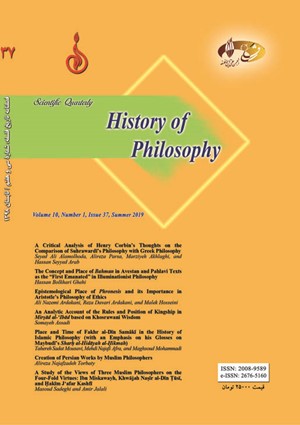Challenges of two genres of tragedy and comedy from Avicenna's point of view according to Aristotle's poetic view
Subject Areas : Geneology of philosophical schools and IdeasFarideh Daliri 1 , Esmail BaniArdalan 2 * , Amir Maziyar 3
1 - PhD candidate of Philosophy of Art, Faculty of Law, Theology, and Political Sciences, Science and Research Branch, Islamic Azad University, Tehran
2 - Associate Professor, Art Research Department, Art University, Tehran
3 - Assistant Professor, Philosophy of Art Department, Art University, Tehran, Iran
Keywords: Aristotle, Avicenna, poetics, tragedy genre, comedy genre,
Abstract :
Aristotle's theory of poetry entered the realm of Iranian thought with the theme that the genres of tragedy and comedy seek to imitate and mimesis virtues and vices. Aristotle's treatise on poetry, despite its role in shaping Western theater, had no effect on the world of Persian poetry. It is necessary that the theater comes from the heart of Greek ontology is a reminder of the need for Iranian drama to have a poetic outlook on Iranian culture. This book has been translated and adapted many times as a reference treatise, and one of the most prominent adaptations is Avicenna's poetry. Although the Avicenna's poetry is a report on Aristotle's poetry, he did not merely suffice to summarize it. The fundamental feature of his work is dealing with the essence of poetry, imitation or imagination. His poetry has new features, points and theories. The fundamental motive of this research is to read Avicenna's approach to the Greek sage Poetics and to study his poetry based on the main genres of Aristotle's Poetics treatise. The passage to this goal with an analytical-descriptive approach and data collection method is a library in which the researcher has achieved the theories of two Greek and Iranian scholars with the intention of Avicenna in writing iranian poetry poetics
ابراهیمپور پشتریگی، مهدیه (1395) بررسی نظریههای زیباشناسی فیلسوفان مسلمان، با تکیه بر مبانی فلسفه آنها، پایاننامه کارشناسی ارشد، دانشکده الهیات و معارف دانشگاه مازندران.
ابنسینا، حسین بن عبدالله (1386ق) فی الشعر، الشفاء، المنطق، تحقیق عبدالرحمن بدوی، قاهره: الدار المصریة للتألیف والترجمه.
ابنسینا، حسین بن عبدالله (1405ق) الشفاء، تحقیق عبدالرحمن بدوی، ابراهیم مدکور و احمد فؤاد الاهوانی، قم: کتابخانه آیتالله مرعشی نجفی.
ابنسینا، حسین بن عبدالله (1966م/الف) الحکمة العروضیة فی معانی الشعر، تحقیق محمد سلیم سالم، قاهره: مرکز تحقیق الثرات و نشره.
ابنسینا، حسین بن عبدالله (1966م/ب) الشفاء، تدوین عبدالرحمن بدوی، قاهره.
ارسطو (1396) درباره هنر شعر، ترجمه سهیل محسن افنان، تهران: حکمت.
ربیعی، هادی (1390) فلسفه هنر ابنسینا، قم: پژوهشگاه علوم و فرهنگ اسلامی.
زرقانی، سیدمهدی (1391) بوطیقای کلاسیک، بررسی تحلیلیـانتقادی نظریه شعر در منابع فلسفی، تهران: سخن.
زرقانی، سیدمهدی؛ حسنزاده نیری، محمدحسن (1393) رسالههای شعری فیلسوفان مسلمان، تهران: سخن.
زرینکوب، عبدالحسین (1381) ارسطو و فن شعر، تهران: امیرکبیر.
عمارتیمقدم، داود (1395) «بررسی و نقد رسالههای شعری فلاسفه مسلمان از فن شعر ارسطو: ترجمه در زمان عسرت»، پژوهشنامه انتقادی متون و برنامهریزی علوم انسانی، شمارة 42، ص176ـ156.
قرطاجنی، ابوالحسن حازم (1966م) منهاج البلغاء و سراج الادباء، تحقیق محمد حبیب ابنخوجه، تونس: دارالکتب الشرقیه.
کوپال، عطاالله (1384) سرچشمه پیدایش کمدی، تهران: قطره.
محمد کمال عبدالعزیز، الفت (1984م) نظریة الشعر عند الفلاسفة المسلمین من الکندی حتی ابنرشد، قاهره: الهیئة العامة للکتاب.
هالیول، استیون (1388) پژوهشی درباره فن شعر ارسطو، ترجمه مهدی نصراللهزاده، تهران: مینوی خرد.
یوسفثانی، سیدمحمود (1396) بوطیقای ارسطو بروایت حکمای اسلامی، تهران: مؤسسة پژوهشی حکمت و فلسفه ایران.
Aristotle (1932). Poetics. trans. by W. H. Fyfe. London: Harvard University Press.
Freytag, Gustav (1900). Technique of the Drama: An Exposition of Dramatic Composition and Art. Chicago: Scott, Foresman and Company.
Garcia Landa, Jose Angel (1987). Aristotle's Poetics. Available at https://ssrn.com/abstract=2423697.
Goodman, Lenn E. (1988). Avicenna. London: Routlege.
Heath, M. (1989). Aristotelian Comedy. Classical Quarterly. Vol.39, No.2. pp.344-354.
Horace (1926). Satires: Epistles and Ars Poetica. trans. by H. Fairclough. Harvard: Loeb Classical Library.

